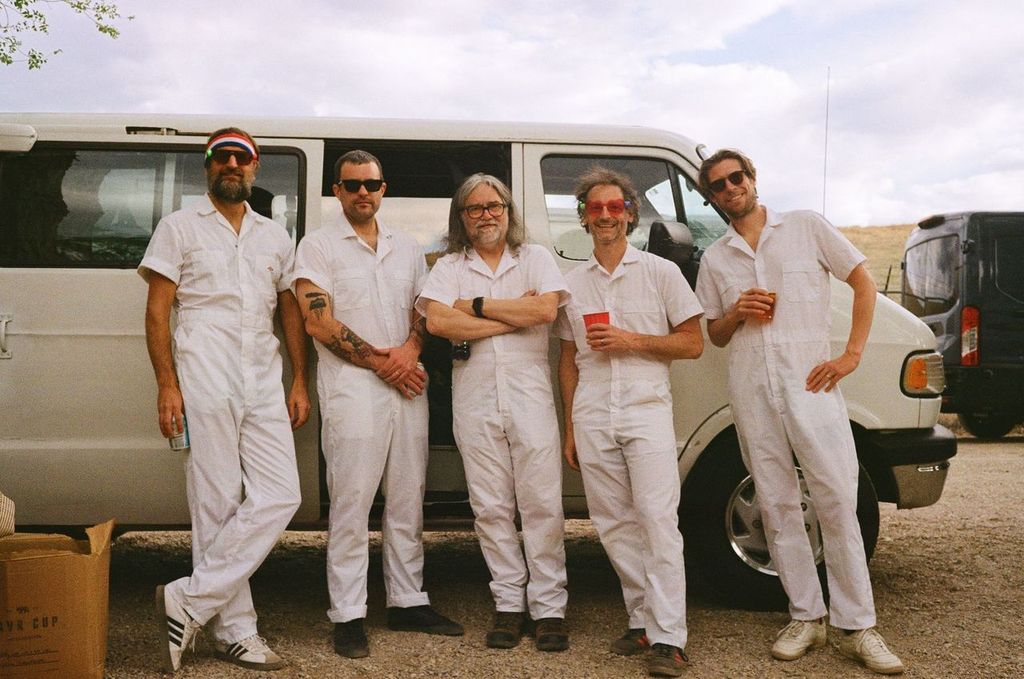
MØTRIK Behind the Kraut
Music Interviews
They are from Portland. They love lasers. They drive a “bratmobile” with an exquisite sound system for recording on the road and a signature Ø on the side. They wear white mechanic jumpsuits and spend hours of rehearsal time trying to split a smoke machine between two traffic cones. They are your favorite krautrock band, MØTRIK.
These five oddballs roll up to micro-festival Schellraiser in a white van—their more practical mode of transportation when they aren’t recording on the road. When I ask to take a picture, lead guitarist Cord Amato is chatting with another artist from the festival, and drummer Lee Ritter pulls him away for the photo. When everyone is in place and the photo is framed, I only count four members. I look to the left and there is Ritter, caught up in the same conversation from which he just pulled Amato. “This is a common occurrence,” jokes Erik Golts, lead singer and bassist. The other two band members are the next guitarist Jonah Nolde and keyboard player Dave Fulton.
Each member has their own distinct characteristics they bring to the band, brought together seemingly by fate. Maybe fate, but Ritter says they owe it to the “petri dish of the Portland music scene” to create this. They told me to include that in the article. “That’s a good one,” they laugh as we sit outside the festival in the back of my car with a camping chair. In this post-show tailgate, I was able to pin down Ritter and Golts for a quick chat.
“[He’s] outwardly sort of a curmudgeon but he has this heart of gold.”
When I ask about Fulton’s personality, they both light up similarly. “He’s amazing,” Golts announces proudly, and I can sense that he holds Fulton to a high level of respect. “[He’s] outwardly sort of a curmudgeon but he has this heart of gold,” Ritter chimes in. Fulton has long gray hair and a beard and he runs the synths like a wizard; a crucial piece to the metallic, transcendental sound of MØTRIK. He is also the main music engineer in the band, though every member—except for Ritter—is a bit of a music engineering nerd.
Deserta plays in the distance while the sun goes down and Golts excitedly points out some tumbleweed piled up against the fence. “Tumbleweed is incredible,” he says with admiration. It’s these small inspirations that undoubtedly set Golts apart as an artist. He seems to see the world through a sense of awe: During the show, he made a point to say, “Ladies and gentleman, the sun piercing the clouds,” and his comments about the band show how much he cares about the art of music.
The whimsical heart of MØTRIK wouldn’t survive without the tick of a motorik beat (a 4/4 beat characteristic of the krautrock genre), though their metaphorical motorik is their sense of humor. The band started when Ritter and Fulton started hanging out at a bar after first being connected through Lee’s dad as a kid. One night they found themselves talking about music and thought, “Wouldn’t it be cool if we created a krautrock band?” Thus was born the band who “has a lot of bad ideas with excellent follow-through,” in the words of Ritter. There are countless examples of this, but my favorite is their mascot: a unicorn/fox hybrid who shoots lasers out of its eyes. It makes sense when you see it.
The band doesn’t take themselves too seriously. Billie Eilish mentions in her recent Zane Lowe interview that artists shouldn’t be afraid to have a sense of humor with their art. Vampire Weekend is never afraid to commit to a bit and poke a little fun at themselves. In his book The Creative Act: A Way of Being, Rick Ross says, “The synergy of a group is as important—if not more important—than the talent of the individuals.” All this is to say that MØTRIK has it figured out without even trying. After its foundation, the band just seemed to click into place.
“The composition, the recording, how it gets produced and engineered—there’s a lot of effort that goes into that and that’s where we shine as a band.”
Though there is not much thought behind their “gimmicks” like laser glasses and jumpsuits, Ritter takes pride in the intention behind the creative process. “The thought that goes into it … the composition, the recording, how it gets produced and engineered—there’s a lot of effort that goes into that and that’s where we shine as a band,” he says. His favorite thing, though, is getting to hang out with the group every week. Golts takes it one step further to add that “locking in” with the band is one of the most rewarding experiences for him. “That’s a very happy place for me. It’s like… good,” he says earnestly. It’s just as powerful to watch a band find that flow state and it’s clear, as you are sucked deeper into their performance, that there is a little bit of magic being created on that stage.
In the end, MØTRIK loves being weird and having fun for the sake of making music, and they aren’t too concerned about what anyone thinks. Meanwhile, they are making some of the best new krautrock today. In every aspect of their music and performance, it’s crystal clear that they do it for the love of it. They are a scientific concoction of eccentric, intelligent, sarcastic and experienced musicians. New music is “in the hopper,” says Golts, projected to be released in the spring of 2025. I hope to see their smoke cone at a Salt Lake City venue soon.
Read more music interviews here:
DIIV Thinks Remixes Are Fucking Cool
Localized: DoomCupcake
